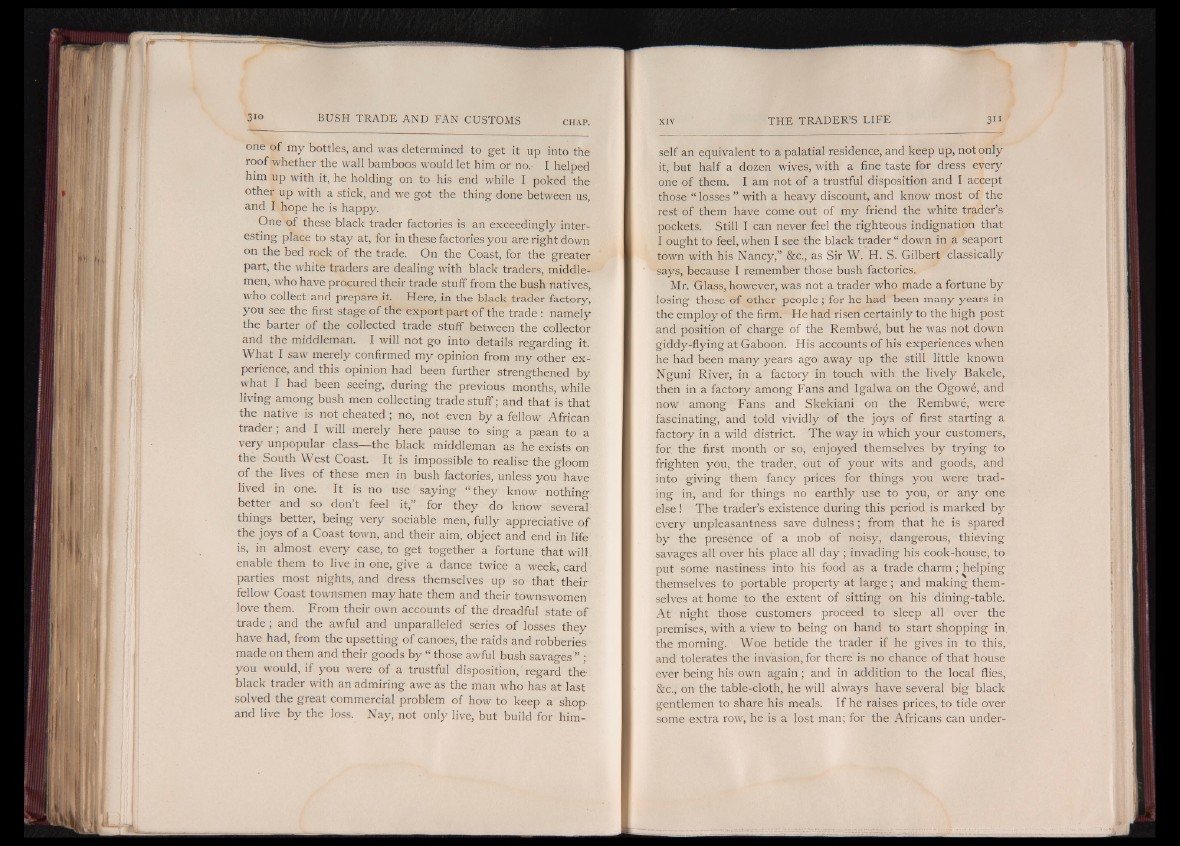
one of my bottles, and was determined to get it up into the
roof whether the wall bamboos would let him or no.- I helped
him up with it, he holding on to his end while I poked the
other up with a stick, and we got the thing done between us,
and I hope he is happy.
One of these black trader factories is an exceedingly interesting
place to stay at, for in these factories you are right down
on the bed rock of the trade. On the Coast, for the greater
part, the white traders are dealing with black traders, middlemen,
who have procured their trade stuff from the bush natives,
who collect and prepare it. Here, in the black trader factory,
you see the first stage of the export part of the trade : namely
the barter of the collected trade stuff between the collector
and the middleman. I will not go into details regarding it.
What I saw merely confirmed my opinion from my other experience,
and this opinion had been further strengthened by
what I had been seeing, during the previous months, while
living among bush men collecting trade stuff; and that is that
the native is not cheated; no, not even by a fellow African
trader; and I will merely here pause to sing a paean to a
very unpopular class the black middleman as he exists on
the South West Coast. It is impossible to realise the gloom
of the lives of these men in bush factories, unless you have
lived in one. It is no use saying “ they know nothing
better and so don’t feel it,” for they do know several
things better, being very sociable men, fully appreciative of
the joys of a Coast town, and their aim, object and end in life
is, in almost every case, to get together a fortune that will
enable them to live in one, give a dance twice a week, card
parties most nights, and dress themselves up so that their
fellow Coast townsmen may hate them and their townswomen
love them. From their own accounts of the dreadful state o f
trade; and the awful and unparalleled series of losses they
have had, from the upsetting of canoes, the raids and robberies
made on them and their goods by “ those awful bush savages” *
you would, if you were of a trustful disposition, regard the
black trader with an admiring awe as the man who has at last
solved the great commercial problem of how to keep a shop
and live by the loss. Nay, not only live, but build for himself
an equivalent to a palatial residence, and keep up, not only
it, but half a dozen wives, with a fine taste for dress every
one of them. I am not of a trustful disposition and I accept
those “ losses ” with a heavy discount, and know most of the
rest of them have come out of my friend the white trader’s
pockets. Still I can never feel the righteous indignation that
I ought to feel, when I see the black trader “ down in a seaport
town with his Nancy,” &c., as Sir W. H. S. Gilbert classically
says, because I remember those bush factories.
Mr. Glass, however, was not a trader who made a fortune by
losing those of other people ; for he had been many years in
the employ of the firm. He had risen certainly to the high post
and position of charge of the Rembwe, but he was not down
giddy-flying at Gaboon. His accounts of his experiences when
he had been many years ago away up the still little known
Nguni River, in a factory in touch with the lively Bakele,
then in a factory among Fans and Igalwa on the Ogowe, and
now among Fans and Skekiani on the Rembwe, were
fascinating, and told vividly of the joys of first starting a
factory in a wild district. The way in which your customers,
for the first month or so, enjoyed themselves by trying to
frighten you, the trader, out of your wits and goods, and
into giving them fancy prices for things you were trading
in, and for things no earthly use to you, or any one
else ! The trader’s existence during this period, is marked by
every unpleasantness save dulness; from that he is spared
by the presence of a mob of noisy, dangerous, thieving
savages all over his place all day ; invading his cook-house, to
put some nastiness into his food as a trade charm; helping
themselves to portable property at large; and making themselves
at home to the extent of sitting on his dining-table.
At night those customers proceed to sleep all over the
premises, with a view to being on hand to start shopping in
the morning. Woe betide the trader if he gives in to this,
and tolerates the invasion, for there is no chance of that house
ever being his own again; and in addition to the local flies,
&c., on the table-cloth, he will always have several big black
gentlemen to share his meals. If he raises prices, to tide over
some extra row, he is a lost man; for the Africans can under